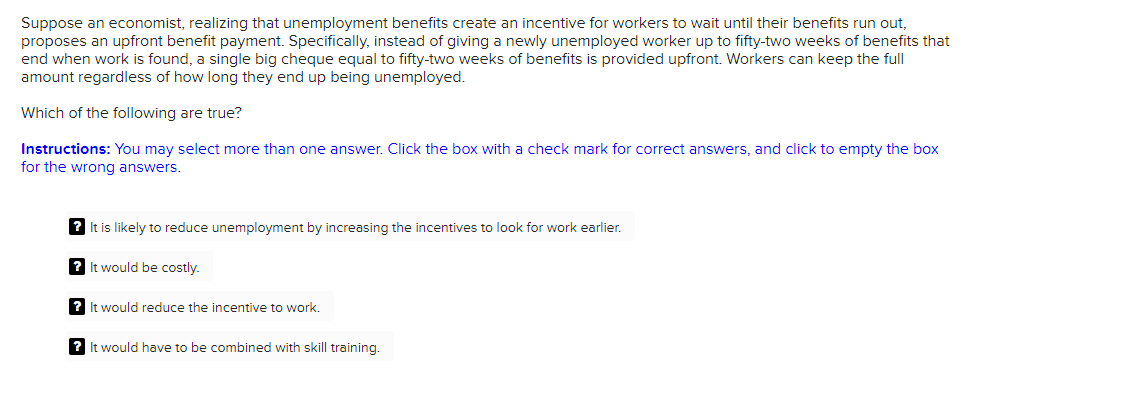Suppose an economist, realizing that unemployment benefits create an incentive for workers to wait until their benefits run out, proposes an upfront benefit payment. Specifically, instead of giving a newly unemployed worker up to fifty-two weeks of benefits that end when work is found, a single big cheque equal to fifty-two weeks of benefits is provided upfront. Workers can keep the full amount regardless of how long they end up being unemployed. Which of the following are true? Instructions: You may select more than one answer. Click the box with a check mark for correct answers, and click to empty the box for the wrong answers. ? It is likely to reduce unemployment by increasing the incentives to look for work earlier. ? It would be costly. ? It would reduce the incentive to work ? It would have to be combined with skill training.
Suppose an economist, realizing that unemployment benefits create an incentive for workers to wait until their benefits run out, proposes an upfront benefit payment. Specifically, instead of giving a newly unemployed worker up to fifty-two weeks of benefits that end when work is found, a single big cheque equal to fifty-two weeks of benefits is provided upfront. Workers can keep the full amount regardless of how long they end up being unemployed. Which of the following are true? Instructions: You may select more than one answer. Click the box with a check mark for correct answers, and click to empty the box for the wrong answers. ? It is likely to reduce unemployment by increasing the incentives to look for work earlier. ? It would be costly. ? It would reduce the incentive to work ? It would have to be combined with skill training.
Macroeconomics: Private and Public Choice (MindTap Course List)
16th Edition
ISBN:9781305506756
Author:James D. Gwartney, Richard L. Stroup, Russell S. Sobel, David A. Macpherson
Publisher:James D. Gwartney, Richard L. Stroup, Russell S. Sobel, David A. Macpherson
Chapter8: Economic Fluctuations, Unemployment, And Inflation
Section: Chapter Questions
Problem 11CQ
Related questions
Question

Transcribed Image Text:Suppose an economist, realizing that unemployment benefits create an incentive for workers to wait until their benefits run out,
proposes an upfront benefit payment. Specifically, instead of giving a newly unemployed worker up to fifty-two weeks of benefits that
end when work is found, a single big cheque equal to fifty-two weeks of benefits is provided upfront. Workers can keep the full
amount regardless of how long they end up being unemployed.
Which of the following are true?
Instructions: You may select more than one answer. Click the box with a check mark for correct answers, and click to empty the box
for the wrong answers.
? It is likely to reduce unemployment by increasing the incentives to look for work earlier.
? It would be costly.
? It would reduce the incentive to work
? It would have to be combined with skill training.
Expert Solution
This question has been solved!
Explore an expertly crafted, step-by-step solution for a thorough understanding of key concepts.
This is a popular solution!
Trending now
This is a popular solution!
Step by step
Solved in 2 steps

Knowledge Booster
Learn more about
Need a deep-dive on the concept behind this application? Look no further. Learn more about this topic, economics and related others by exploring similar questions and additional content below.Recommended textbooks for you

Macroeconomics: Private and Public Choice (MindTa…
Economics
ISBN:
9781305506756
Author:
James D. Gwartney, Richard L. Stroup, Russell S. Sobel, David A. Macpherson
Publisher:
Cengage Learning

Economics: Private and Public Choice (MindTap Cou…
Economics
ISBN:
9781305506725
Author:
James D. Gwartney, Richard L. Stroup, Russell S. Sobel, David A. Macpherson
Publisher:
Cengage Learning


Macroeconomics: Private and Public Choice (MindTa…
Economics
ISBN:
9781305506756
Author:
James D. Gwartney, Richard L. Stroup, Russell S. Sobel, David A. Macpherson
Publisher:
Cengage Learning

Economics: Private and Public Choice (MindTap Cou…
Economics
ISBN:
9781305506725
Author:
James D. Gwartney, Richard L. Stroup, Russell S. Sobel, David A. Macpherson
Publisher:
Cengage Learning
